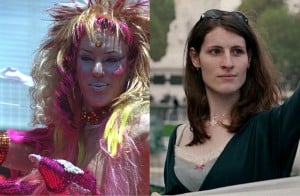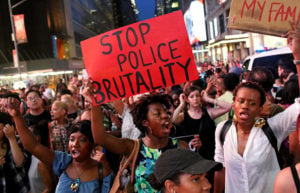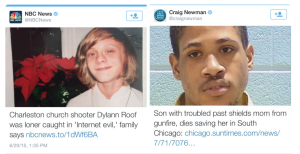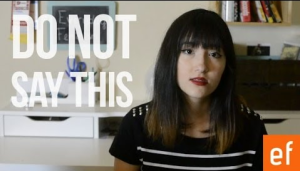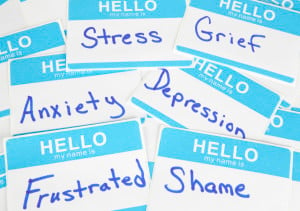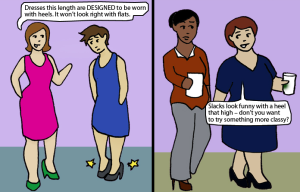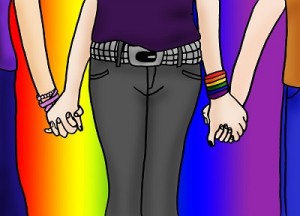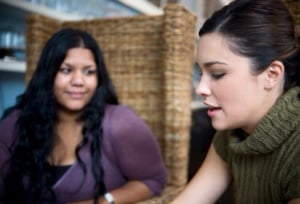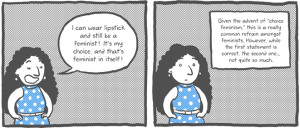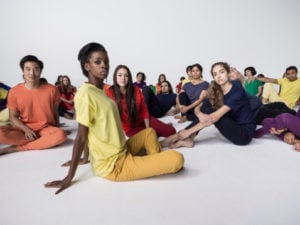“You’re a racist!” the young woman yelled at me as she entered the room.
“E…e…excuse me?” I stammered.
“Aren’t you my son’s teacher?”
“Yes.”
“Did you send him out in the hall to finish his work today — AGAIN?”
“Yes. He couldn’t seem to keep from talking, loudly, to his neighbor.”
“Were there other kids talking to their neighbors?”
“Maybe,” I responded as my brain raced to remember the classroom dynamics at the time of the incident. “But I had asked him twice already. This was the third reminder. I then asked him to move himself into the hall and finish his work.”
That didn’t seem unreasonable to me. It was true this student probably spent more time in the hallway completing his work than others in the class, but it seemed a habit he just couldn’t break.
He was constantly talking with whoever was sitting next to him and his voice was always loud. It was disruptive.
… And he wasn’t the only one in the class with that issue. Two other of his classmates had similar issues (both white, I realize). It had always seemed to me, however, that this young man was the ringleader, particularly since once he was removed the others quieted down.
“Do you have any idea what you’re doing to him socially? He’s got other kids harassing him, telling him he’s a bad kid.”
The young mother continued, “One of his friends won’t even play with him anymore on the playground. If he were a white kid, would you be treating him like that? I don’t think so. You’re a racist!”
I sat quietly for a minute. I consider myself an ally, working towards the reduction of oppression, of racism. I knew enough to know that I didn’t know enough in this situation.
“Okay. Let’s start over. Can you tell me how what I’m doing is racist?”
“I just told you. If he was white, you’d treat him different. You wouldn’t send him into the hall to do his work.”
Maybe she was right.
How Could I Be A Racist?
I have spent a long time now as, what I consider, an ally to people of color. It has required me to educate myself, educate my children, and anyone else who will listen. I understand the theory of oppression, of racism, that defines it is a system of power.
I live and experience my own white-passing privilege as a mixed-race Native person with awareness and an honest attempt to recognize it, appreciate it, and work to raise social consciousness to eliminate it — It’s an interesting balance.
I treat people in my everyday life as people first. Some of them are jerks and some of them are wonderful. Some days I’m a jerk and some days I’m wonderful.
I recognize that it’s about who we are as people, not at all related to what shade of human we wear.
I don’t adhere to the I-don’t-see-color philosophy; just as I am clear my skin complexion is white, I recognize those of different hues.
In any given environment, I note my status — am I the only white face? Are there other white faces? Is that person there the only person of color?
At the same time, I don’t consciously categorize people within stereotypes. Purple hair, brown skin, blue eyes, it doesn’t matter to my intellectual mind. I have always believed that I allow people to show up as who they are and go from there.
That’s why I know I’m not a racist —
intentionally.
But Is It Possible that I Could Be an Unintentional Racist?
I think back to television humor and living room conversations, to jokes and comedians, books and poems. There are things that are said without intention that are deeply racist, that propagate and reinforce stereotypes and discrimination.
It’s everything from almost any phrase out of white person’s mouth that starts with “Black people just need to…” or “Asians are all ….” to the phrases that include “they” or “those people.”
That all-encompassing concept that, based on the color of your skin, you suddenly have everything in common with everyone else who has that skin color — the good and the bad, but mostly the bad.
This is the idea of unintentional racism: there are socially conditioned things we do and say that don’t register as offensive or oppressive to us — but they absolutely are to so many others. And they cause harm.
Without a raised awareness of those unintentional, socially conditioned responses, they never stop. Calling each other on it, catching it in ourselves, that’s the responsibility of privilege.
It’s wrapped subversively and insidiously in phrases like “All People Matter” and “Why don’t we have White History Month?”
It’s in our language that uses black as a descriptive word of bad and scary things that is then used to describe a shade of people.
It’s what happens when teachers expect Asian students to excel in science and math and Latino/a students to not speak fluent English.
Or when I over-identify a Black student as loud and disruptive.
That means racism isn’t about intentionality. I can be unintentionally racist.
I can be a racist, an unintentional-system-supporting racist.
Where Did It Start and How Does It End?
The bureaucratic systems of this country — education, industry, social service, military, government — are all based, run, and operated on the values, beliefs, and mindset of the culture of power: white, male, with money.
That means those values, beliefs, and mindsets are throughout the system in its entirety, that the system was built that way, has always been that way, and works really hard to protect itself.
Consider, Head Start, a nationally known early childhood program developed for low-income families with at-risk children (a phrase requiring a whole ‘nother article). The values this program upholds are those of white middle-to-upper class people.
For example, well-baby check-ups are required for program participation. That is the practice of taking a healthy baby to the doctor every few months to be sure they are developing appropriately and there are no early signs of issues.
From the perspective of many participants, that’s taking a perfectly healthy baby to the doctor so they can tell the parents it is a perfectly healthy baby. By and large, those who have experienced generational poverty maintain a mindset that you only go to the doctor if you need it.
It’s not about rejecting services; it’s about the fact that mandatory services enforced by the system doesn’t take into consideration all the ways that same system excludes and marginalizes people.
For some participants, it’s about protecting resources. These requirements demand parents to take time off of a job that won’t pay you if you don’t work — regardless of the reason — and that’s necessary survival money. They don’t consider that a visit to the doctor requires a co-pay or full coverage, and transportation by bus or car, all things that come at a cost.
These are resources that already don’t stretch far enough.
Furthermore, not all families served by the program ascribe to the Western medical model. There seemingly is no room for alternative, non-Western practices that may not have the same values or expectations.
Indeed, much of medical practice is built on a white male model and steeped in colonization ideals that compromise the sense of safety required to trust your children to it.
Failure to comply to the expectation; however, gets your child kicked out of the program.
Remember that the neighborhoods in which such programs are anchored are largely comprised of families of color.
When the white, well-meaning classroom teacher or family services worker has to tell the families that they have to ‘do it or else’ it is a form of unintentional racism.
It stems from institutionalized white supremacy.
***
All oppression, including racism, requires a SYSTEM of imbalance that gives one group benefits and glory solely based on belonging to that group. As a person who experiences white privilege, there are automatic assumptions made about me and for me.
In order to be racist you must belong to the privilege group. That’s why I can be appropriately seen as a racist, regardless of my intention, when I call a brown-skinned student out for talking more than his light-skinned peers.
The stark difference is intent versus impact. THAT is how I can be an unintentional racist.
School rules related to group norms, white group norms, place a target directly on those who don’t follow those group norms.
As schools increase in their policy of zero tolerance, those who fall outside the norms — who are never taught to bridge the gap, never taught the rules of the culture of power or reject it because it conflicts with their culture or needs — fall deeply between the cracks as discipline becomes more and more severe.
This is the experience of our students of color.
The result is what has become known as the “school to prison pipeline.” This travesty is the impact of non-culturally responsive education — even if it is not the intention.
Education is not the only system that reeks this level of devastation. Bureaucratic organizations are built on the norms of forefathers who were white men with land whose perspective was that white men with land were the people of value.
While the social rhetoric has altered to begin to take on social responsibility of equity, the systems haven’t changed. The rules, ideals, and mechanisms continue to follow the models that reflect colonized, white values.
THIS is how my white privilege allows me to continue the trauma and oppression without ever meaning to.
It is critical, then, to raise our awareness, to understand that racism is less about the individual and more about the system and the impact — regardless of the intention.
That’s how, even as an ally, doing my best to walk shoulder to shoulder with my brown skinned colleagues, I can still be a racist.
That’s why my continued education, learning, and listening are SO important.
That’s why while I am the only one responsible for making sure I’m living accordingly to my anti-oppression values, I also invite those on this journey with me, whether marginalized or privileged, to inform me when I’m doing something that is inherently racist, when my socially conditioned responses are reinforcing the racist, oppressive system.
We need each other to learn and grow on this journey of dismantling oppression and racism. We need each other to recognize that no one is perfect and to remind and push and prod each other with compassion to get to the best of who we are becoming as allies, as colleagues, as friends, as humans.
[do_widget id=’text-101′]
Leah R. Kyaio is a Contributing Writer for Everyday Feminism and co-owns and operates With Respect, LLC, creating strengths-based solutions for violence and oppression. Her work includes professional and organizational development, team-focused consultant work, individual coaching for front line to executive personnel, and systems analysis and restructuring. To learn more about how it all comes together, visit her website.
Search our 3000+ articles!
Read our articles about:
Our online racial justice training
Used by hundreds of universities, non-profits, and businesses.
Click to learn more








